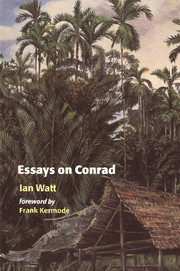Book contents
- Frontmatter
- Contents
- Foreword
- Acknowledgements
- Chapter 1 Joseph Conrad: alienation and commitment
- Chapter 2 Almayer's Folly: introduction
- Chapter 3 Conrad criticism and The Nigger of the ‘Narcissus’
- Chapter 4 Conrad's Heart of Darkness and the critics
- Chapter 5 Comedy and humour in Typhoon
- Chapter 6 The political and social background of The Secret Agent
- Chapter 7 ‘The Secret Sharer’: introduction
- Chapter 8 Conrad, James and Chance
- Chapter 9 Story and idea in Conrad's The Shadow-Line
- Chapter 10 The decline of the decline: notes on Conrad's reputation
- Chapter 11 Around Conrad's grave in the Canterbury cemetery – a retrospect
- Chapter 12 ‘The Bridge over the River Kwai’ as myth
- Index
Chapter 1 - Joseph Conrad: alienation and commitment
Published online by Cambridge University Press: 22 September 2009
- Frontmatter
- Contents
- Foreword
- Acknowledgements
- Chapter 1 Joseph Conrad: alienation and commitment
- Chapter 2 Almayer's Folly: introduction
- Chapter 3 Conrad criticism and The Nigger of the ‘Narcissus’
- Chapter 4 Conrad's Heart of Darkness and the critics
- Chapter 5 Comedy and humour in Typhoon
- Chapter 6 The political and social background of The Secret Agent
- Chapter 7 ‘The Secret Sharer’: introduction
- Chapter 8 Conrad, James and Chance
- Chapter 9 Story and idea in Conrad's The Shadow-Line
- Chapter 10 The decline of the decline: notes on Conrad's reputation
- Chapter 11 Around Conrad's grave in the Canterbury cemetery – a retrospect
- Chapter 12 ‘The Bridge over the River Kwai’ as myth
- Index
Summary
The doubts of the critics about the whole history-of-ideas approach are understandable enough: one way of not experiencing King Lear is to underline a few passages containing recognizable ideas, and to make the gratifying reflexion that the Great Chain of Being is really there. The search for such portable intellectual contents as can be prised loose from a work of imagination is likely to deflect attention from what it can most characteristically yield, in exchange for a few abstract ideas whose natures and inter-relationships are much more exactly stated in formal philosophy. And if we cannot base our literary judgements on philosophical criteria, we must be equally on our guard against the criteria of the historian of ideas, which naturally place most value on literary works which are ideologically representative; whereas the greatest authors actually seem not so much to reflect the intellectual system of their age as to express more or less directly its inherent contradictions, or the very partial nature of its capacity for dealing with the facts of experience. This seems to be true of Chaucer and Shakespeare; and it tends to become truer as we come down to the modern world, in which no single intellectual system has commanded anything like general acceptance.
All these are familiar objections; and as regards criticism of modern literature they have been reinforced by a new form of philosophy's old objections to the cognitive validity of art – by the symbolist aesthetic's rejection of all forms of abstraction and conceptualization.
- Type
- Chapter
- Information
- Essays on Conrad , pp. 1 - 19Publisher: Cambridge University PressPrint publication year: 2000
- 1
- Cited by



